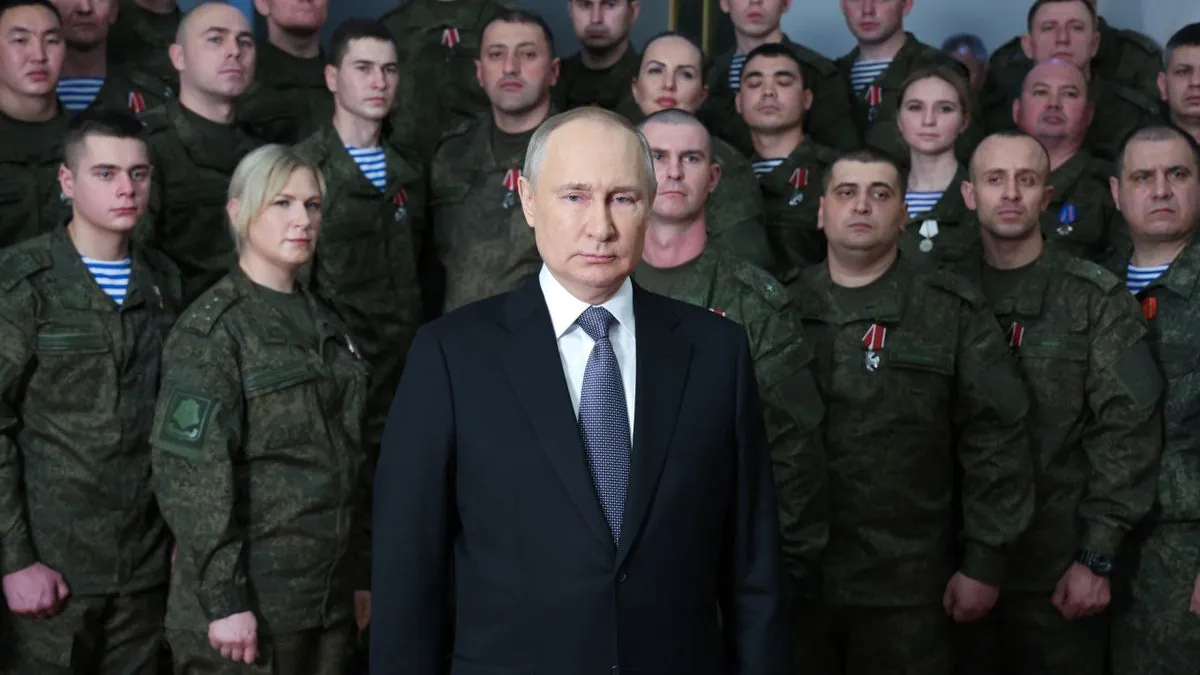Russia Revises Nuclear Policy, Signaling Potential Consequences to West
Russia modifies its nuclear doctrine, allowing nuclear response to conventional attacks. Kremlin spokesman describes it as a warning to Western nations about potential consequences of involvement in Ukraine conflict.

In a significant development, Vladimir Putin, the President of Russia, has announced modifications to the country's nuclear weapons policy. This revision, occurring exactly one year ago today, on September 26, 2023, broadens the scenarios under which Russia might employ nuclear weapons, including in response to conventional missile strikes.
The Kremlin has framed these changes as a clear message to Western nations, warning of potential repercussions should they participate in attacks against Russia. Dmitry Peskov, the Kremlin spokesman, stated, "This should be considered a definite signal," emphasizing that it serves as a caution about the consequences of involvement in actions against Russia, regardless of the means employed.
These alterations to Russia's nuclear doctrine are outlined in a document titled "The Foundations of State Policy in the Sphere of Nuclear Deterrence." The decision to revise this policy appears to be Moscow's response to discussions in the United States and United Kingdom regarding the possibility of allowing Ukraine to use Western-supplied conventional missiles against Russian territory.

The concept of nuclear deterrence, which emerged during the Cold War, has been a cornerstone of international security for decades. The United States and Russia, inheriting the legacy of the Cold War, currently possess approximately 90% of the world's nuclear warheads. This concentration of nuclear power underscores the significance of any changes to nuclear policies by these nations.
Peskov described the current geopolitical situation as an "unprecedented confrontation," attributing it to the "direct involvement of Western countries, including nuclear powers" in the ongoing conflict in Ukraine. This statement reflects the heightened tensions between Russia and the West, reminiscent of Cold War-era nuclear standoffs such as the Cuban Missile Crisis in 1962.
Russia's current nuclear doctrine, established by a decree from Putin in 2020, permits the use of nuclear weapons in two scenarios: in response to a nuclear attack by an adversary or in the face of a conventional attack that threatens the state's existence. The newly announced changes expand these conditions, potentially lowering the threshold for nuclear weapon use.
The international community has long worked towards nuclear disarmament and non-proliferation. The Nuclear Non-Proliferation Treaty, opened for signature in 1968, and the more recent Treaty on the Prohibition of Nuclear Weapons, which entered into force in 2021, exemplify these efforts. However, major nuclear powers, including Russia, have not signed the latter treaty.
As tensions escalate, the symbolic Doomsday Clock, maintained by the Bulletin of the Atomic Scientists to represent the likelihood of a man-made global catastrophe, may be affected by these developments. The clock serves as a stark reminder of the potential consequences of nuclear conflicts.
The Kremlin has not yet decided whether to publish the revised nuclear documents, leaving room for speculation about the specific details of the changes. This uncertainty adds to the complexity of the situation and may impact international relations and security strategies.
"This is a signal that warns these countries about the consequences if they participate in an attack on our country by various means, and not necessarily nuclear ones."
As the world observes these developments, the international community must grapple with the implications of Russia's revised nuclear policy. The situation underscores the ongoing relevance of nuclear deterrence strategies and the delicate balance of power in global politics.


































